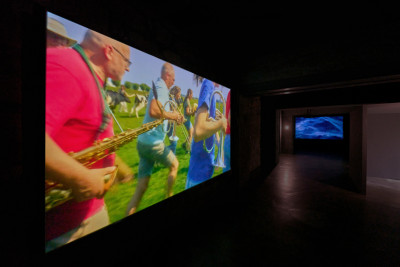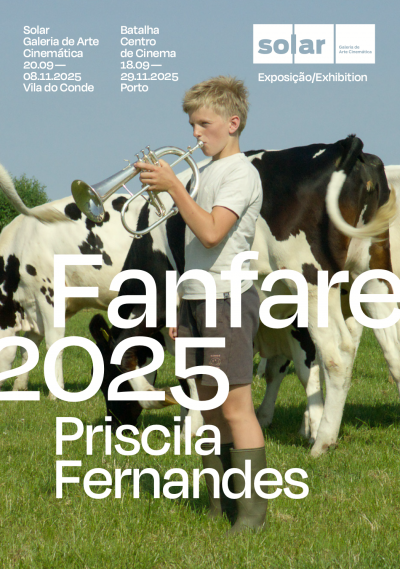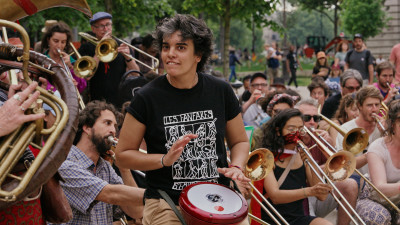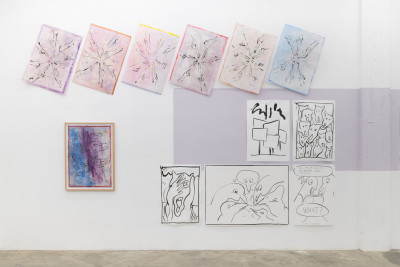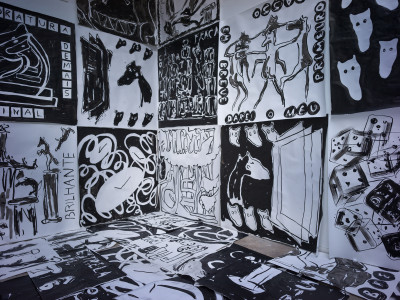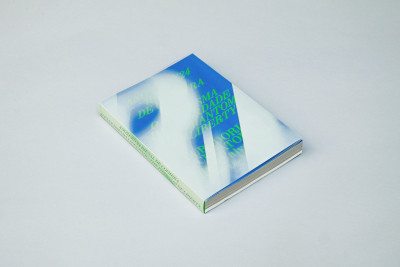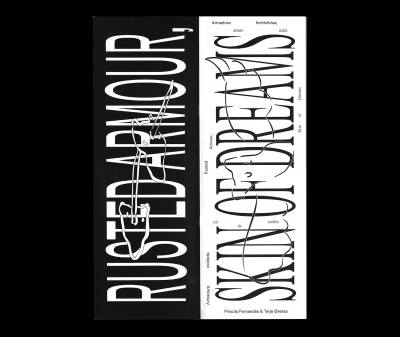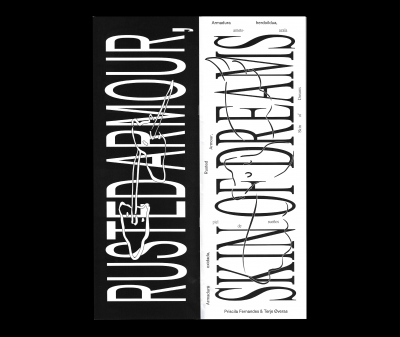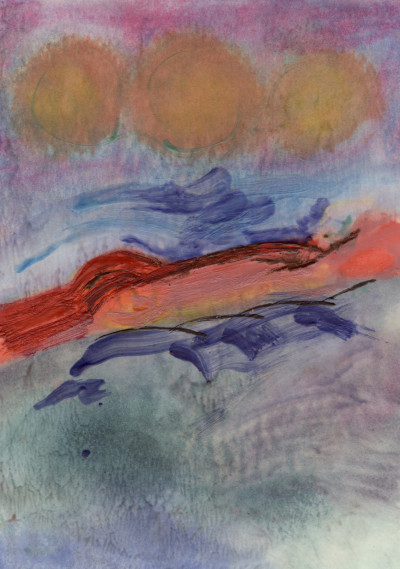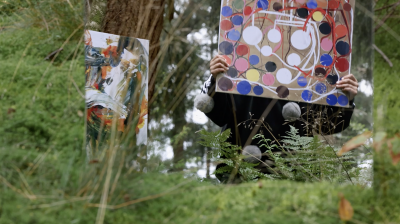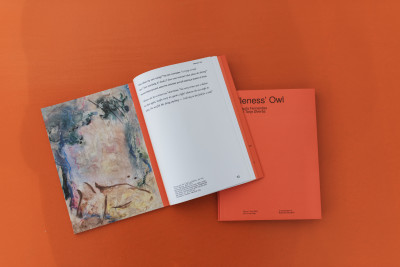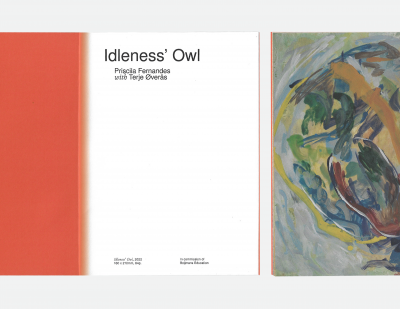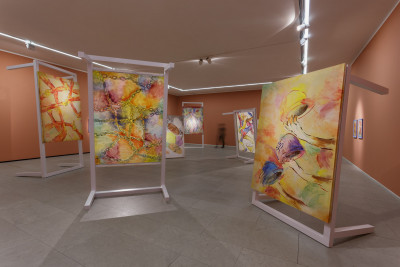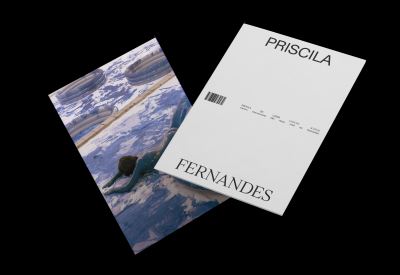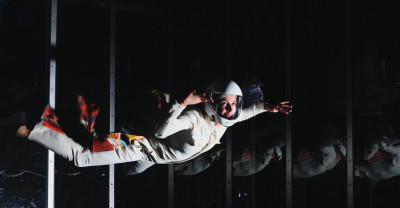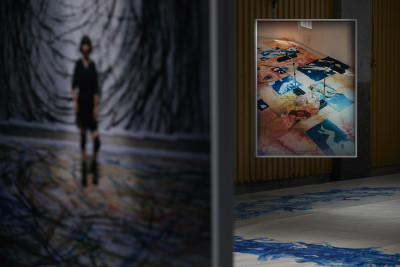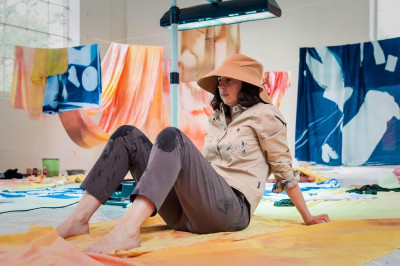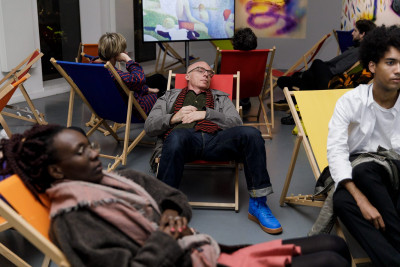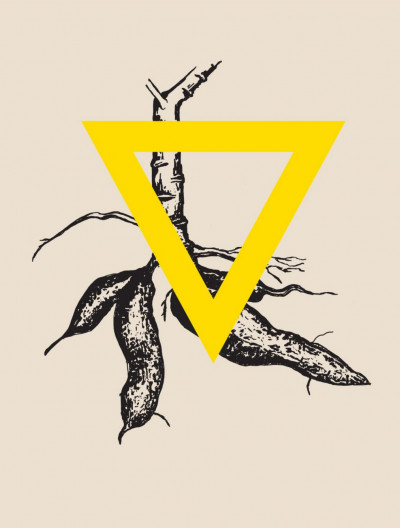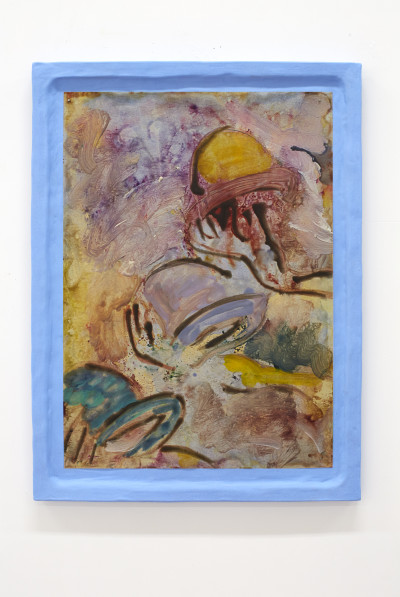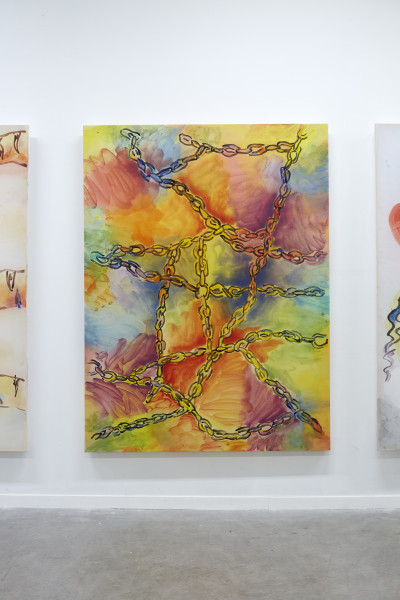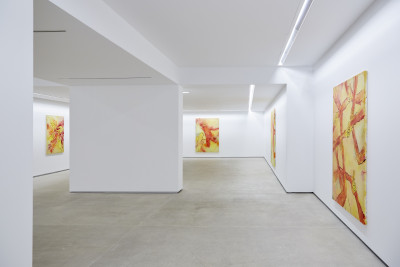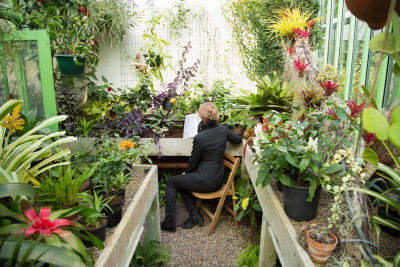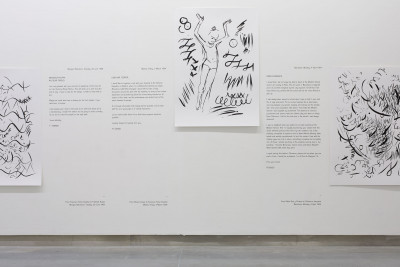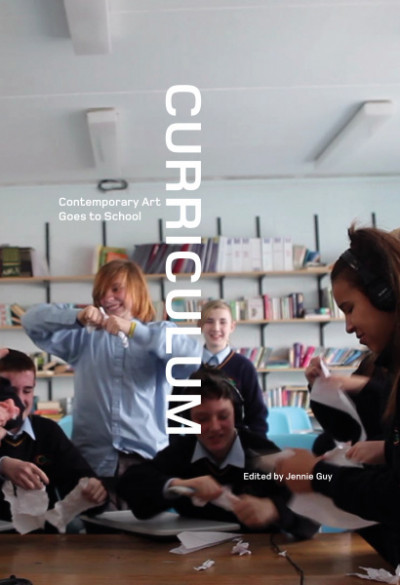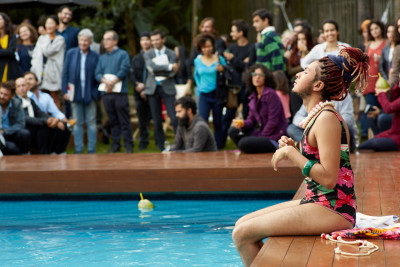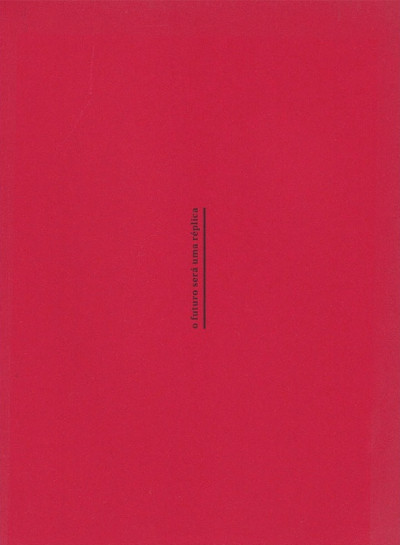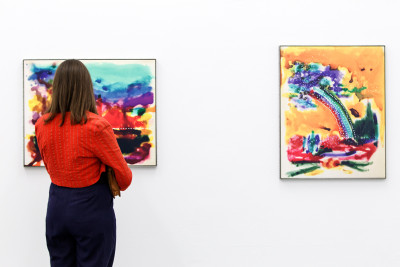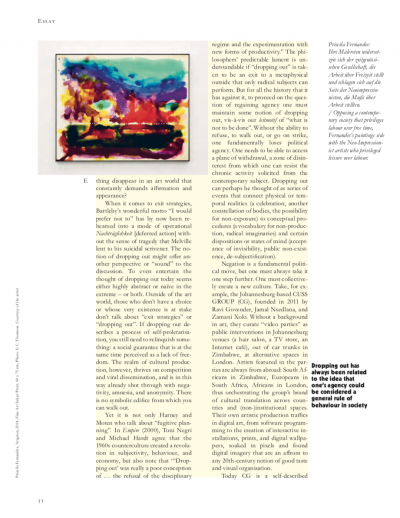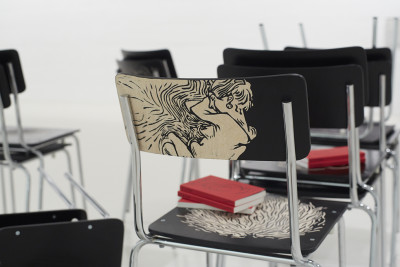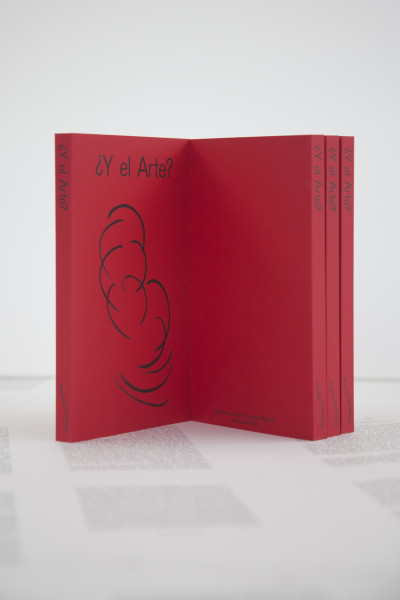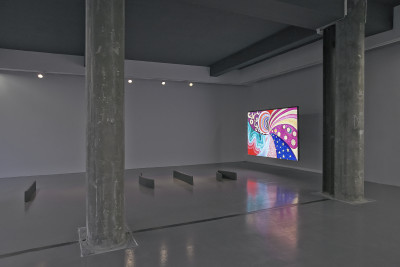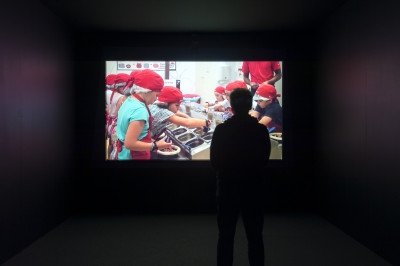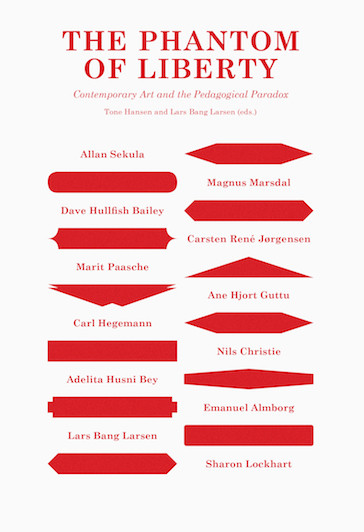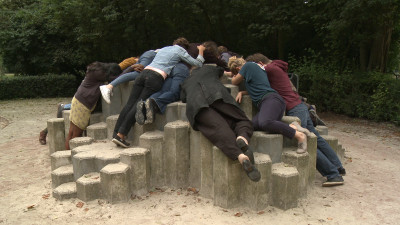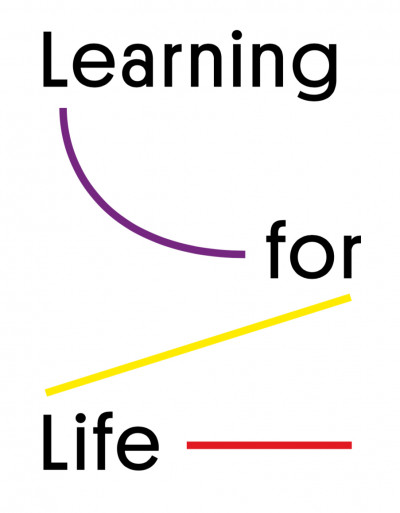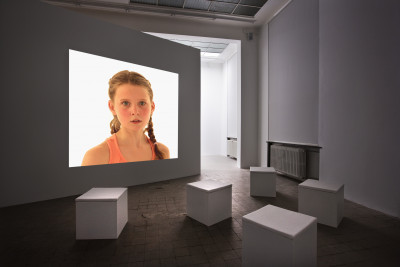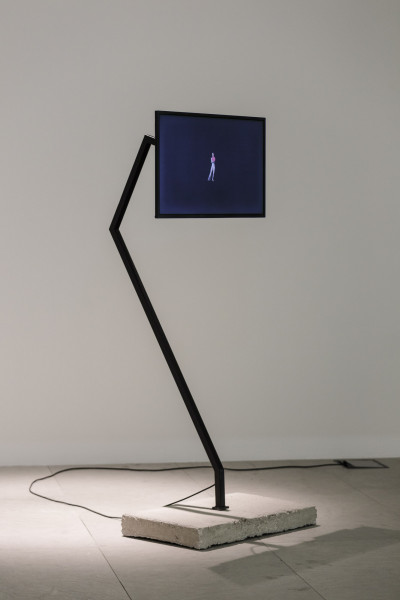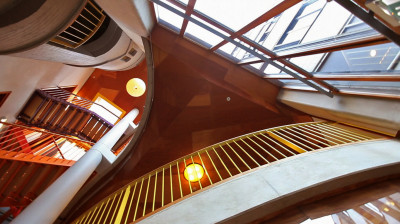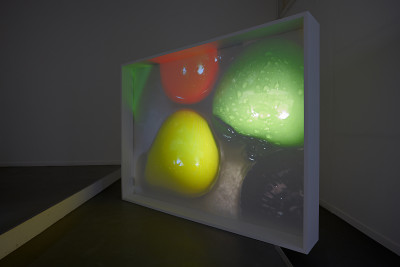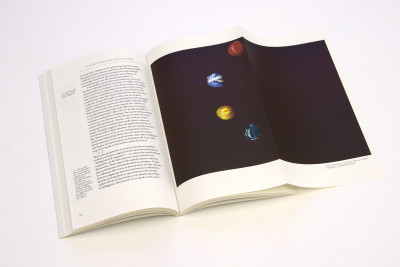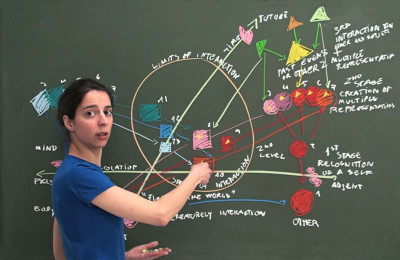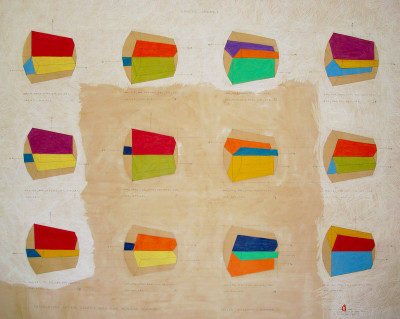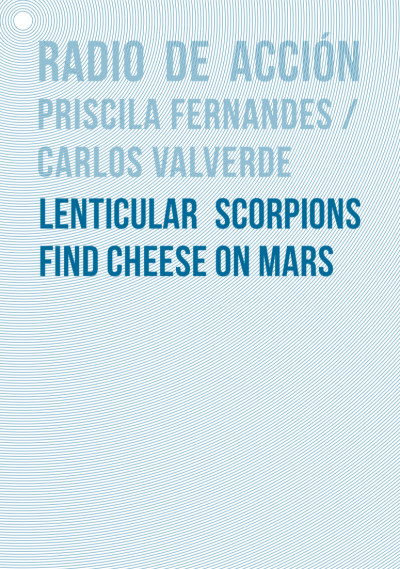In darkness all cats are grey De noite todos os gatos são pardos
Priscila Fernandes
This is the English version of the audio play.
Published in 2017
Every night hordes of people can be found walking, marching or wandering around the park. They seem to be stuck at the edge, continuously tracing the periphery, a permanent accentuation of the park’s shape, forever highlighting the bushes and trees that surround it. Only treading the path separating the city from the park.
They are from all walks of life. And Augustus knows it. Every night he takes meticulous notes of these passers-by. He sets up his office at the north entrance, always impeccably dressed, in a suit and tie, neat and tidy. His hair styled literally with a fine tooth comb. He brings with him a table and a little stool, a folder of paperwork, a small pen and a rubber stamp.
Although he has often heard it said that it is inside the park that one finds happiness – true happi-ness – Augustus has never felt like going in. He has been a civil servant all his life and he is more than comfortable with rigid bureaucratic routine. His pleasure is found right there, at the entrance of the park. August makes efficient inventories of the people who pass by. He never wastes time with distractions or gossip, but just rigorously records the names, ages and the ambitions of those who are looking for a way in. It is thanks to Augustus’ thorough research that we receive accounts of the people who circulate the park: real bodies, bodies that are whole, bodies in themselves, bodies that remain whole.
- Jerome, an avid philosopher and etymologist, has been covering the circuit around the park for over four years. Every night he takes the same route without ever finding an entrance. But he doesn't lose heart. On the contrary, he only has to re-read a part of the ancient texts and his hope is rejuvenated. According to what is written, the sky hovers over no park as peaceful, cheerful and attractive as this one, in it there are no concerns, no effort, no work. Well, for Jerome, to live in such a place would not be a problem. In his eyes, laziness and refusal of productivity are fine qualities.
- In the beginning was ócio [idleness] – Jerome explains – from the Latin otium! Only after that does the word negócio [business] come into play, nec otium – nec being negative and indicating time with no leisure. In other words, we assume that ócio [idleness] was time for leisure, but it was business that came to take the place of idleness. We only need to look at the Romans to understand, they woke up when they wanted, lounging at the bath houses where they would stay until the end of the day, exercising their bodies, enjoying the saunas and stretching for hours at the poolside. This was where they discussed politics and business. Businessmen today would undoubtedly say that the Roman Empire was doomed to fail - Jerome tells us-
Well, the Empire did fail. Not to mention that idleness was only possible by exploiting others. Small details Jerome omits from his philosophy:
- Now, it is precisely because of that idleness – he continues – that the arts were cultivated! That science was discovered! That philosophy and the humanities were invented! So the poet said:
Soft laziness sheltering us
From evil wanting and a thousand foolish things…
Because of you, how many evil deeds
Did I not do.
But pleasurable laziness is hated by many. Doctor Clare spends entire nights on the outer edge of the park, disturbed by what she can and cannot see behind the bushes . She thinks Jerome’s ideas are very dangerous for the youth of today. She spies through the bushes, believing she can see orgies of bodies with ravenous sexual appetites, tremendous indifference, fatigue and boredom. A consequence of the lack of work.
- “If I manage to get into the park” – she thinks out loud – “I would prescribe a few things… anti-masturbation corsets for the boys; instructive books and films for the girls, no horse riding, un-chaperoned walks or novels. And chastity belts, of course!”
It is thanks to Augustus’ thorough research that we know of these people from all walks of life, who hope to enter the park. There are also those wandering around starving. And, as we know, hunger is the strongest fire. They tell us about ..
- The fish in the park's lake- already roasted, boiled or fried, to suit your taste! Roasted pigs trot around with a knife in their backs, so whoever feels hungry can easily cut off a slice of bacon. And the chickens, scratching to and fro, are baked and drizzled with gravy. And they self advertise: Hot chicken! Hot - hot chicken!
Augustus has noticed that for some years now the number of individuals whining that the park only allows entrance to losers and tramps has grown into a deafening chorus. They complain that the park has only let in those who have completely abandoned their virtues and decency. They say the park is now so depraved that it even gives money to those who fart. Apparently, whoever burps three times and does gets out a ginormous fart makes a fortune. Mary is one of the complainers, she says the park is no longer what it used to be, that now it is a filthy disgrace, driving out everyone that is upright, honest, well behaved and hard-working.
The entrance of the park is even quite easy to find, but for reasons unknown to us, few people can find it – it’s one of those mysteries… And those who do, begin to adopt very strange behaviour. This happens especially at the southern entrance of the park, where there is always a large crowd, all glued to each other. They are whole bodies, bodies in themselves, bodies that remain whole. They march and march but get nowhere. With one exception: when the first cry of an owl is heard, the group moves a little further. One step every night. Other than that, they march and march but never leave the path surrounding the park. We don't know why. The clothes of those who march and march have long borne witness to the traces of the trek of time – shoes with holes in them, jumpers made of rainwater… In their hands they carry torches.
Knock knock!
Who’s there?
Olive!
Olive who?
Olive you!
This is Cleo, there is not much to say,
Except that she is a nice girl.
She dreams about entering the park, like all the others, for the most part.
She knows the way does not have to be as hard as they say. The important thing is to remain positive, optimistic and the rest will follow. And if there can be a bit of fun along the way, then all the better! It always helps to pass the time. She knows that a park that claims to be so easy-going can’t be so hard to get into. It’s only logical. On her way around the park she amuses herself by humming, admiring the view, and when in the mood, making jokes about the other entrance seekers:
Once upon the time of twats, I saw
a one-legged man
run faster than a fast horse.
I then saw a wandering axe
cut a tree in two.
I then saw the fallen tree
Get up again.
I then saw a plough plough
Without a horse, without a cow.
I then heard the fish making so much noise
that it reached the sky.
I then saw two crows
reaping the wheat.
I then saw two mosquitoes
Making a bridge.
I then saw a mouse
building a huge wall.
I then saw an evil horse get up
and speak disjointed truths.
I then saw two goats
turn on an oven.
I then heard a chicken speak:
- it has been proclaimed:
- A thunderous fart
has been proclaimed!
A good scholar of these verses might conclude that each of these characters represents one of the many individuals circling the park. Especially the last verses, yes, those describing the fetid anal wind, because there is an idiot who wonders around every night, farting with every step he takes. It’s Donald, a sly and opportunistic twat who claims to be the first man to have entered the park, even though he doesn't even know where the entrance is. He is smart to spread this rumours, be-cause it creates insecurity in those he meets. But Donald is also a little mad: can you believe the guy gets spell bound by the shards of glass he finds on the ground as he laps the boundary of the park? Perhaps it is the reflection of the moon, or just his stupidity, that fixes him to the spot, frozen, staring at the glass.. “With a bit of luck, well polished” – he thinks – “they could even look like dia-monds”. Perhaps it is also the Moon that conjures up visions of exotic treasure: rare birds flying through the park, naked women, spices and colourful silks, riches falling from the sky. He sees wondrous things and exclaims:
- “My dear, your lover has finally arrived!”
And, having said that, he tears off his clothes and runs naked like an fool, pissing like a dog at every tree and bush outside the park.
Francis comes from afar, and has never had much luck. He wasn't taught to read and write, eve-rything he knows about the park he learnt by word of mouth. Of course a tale always grows in the telling - Francis knows this well - experience is the best teacher . But the essence is still there. The park symbolises his freedom —the end of a life of work and slavery in the city. Francis walks around the park every night with the hope of being able to get in. But often his fatigue is so great that he falls asleep on the cold path. And every night the same nightmares loom over his hope.
- “I constantly dream that to enter the park I have to knock down the trees that appear in my way. Then I take my axe and walk and walk and walk until I find a clearing closed off by several trees – one is so big, bigger than ever seen in my life. I decide that this is precisely the one I should cut down. Even though the wood is very hard, I manage to cut it down. But the moment the tree falls down, it rises up again and the trunk sticks back to the stump. This always amazes me. And I keep trying.. When I finally manage to cut the tree, the whole story starts again. The tree keeps repairing itself. At that point I start to get terrified, I panic and start to swing the axe into the tree like a maniac. Even when my arms burn with pain, my hands become covered in callouses and I’m dripping with sweat... no matter what I do every time the tree falls, it immediately rises up again. And, while this happens, I hear laughter in the distance. Every time I wake up from that dream, I feel sad… Perhaps it’s a premonition warning me of the uselessness of what I'm doing. In this moment the day breaks and I have to get back to the city. – ends Francis.
Apparently, Joey never felt the urge or desire to go into the park himself. He was interested in living off those who wandered around it, it did not matter how. Ever since he was a child,
Joey had no trouble devising wicked plans, whether involving theft, exploitation or lies.
He saw these misdemeanours as acts of kindness since, since according to him, everyone would be happier if relieved of their everyday luxury goods - from the latest iPhone to their trendy branded clothes… and so on.
Joey was committed to freeing everyone from their capital sins, and considered his actions, acts of mercy - he thought of himself as a saint. He lived of these gains, with such piety and sobriety, that, he was saintly, all right!
Once he met Mary, who we already know, that pious woman dressed in black and veiled, as tradi-tion dictates. Her chastity and virtuousness were such that the most glamorous item of her wardrobe was the little rosary she carried in her hands.
Well then, Joey, who paid special attention to the subject of geology, immediately realised that the rosary this humble lady was carrying was made of emerald, jacinth and diamond crystals.
Joey, who considered himself a saint, thought right there and then that an ostentation such as this rosary did not suit such a humble lady. And so, to save her from this sin, he set to the mission of convincing her to donate that little rosary to his continuous charitable work. For he was a saint after all!
- “My dear lady, how happy I am to see such a pious, humble person at the doors of this park. How happy I am to have your company. Because this work, this mission, entrusted to me by the apostle of Rome, in Rome, is very solitary and strenuous. Do listen my friend, for I have been in-side the park and God has given me the wisdom to tell you what exists behind these gates. Lis-ten to my words for I will tell you about those who walk inside it and you will see how important our prayers and charitable work are.
I can tell you that at the centre of the park, next to the lake, there is a beautiful abbey full of tall, young, lively monks. But do not let yourself be fooled, my lady of great charity, for every single day the young monks, after eating and drinking at ease – for they do not see that as a sin – they take to the air, flying and playing like birds in the sky. Miraculously they can fly, and there is no bird as fast as these monks of noble spirit, thanks to the large flapping sleeves and cowl of their habits. When the abbot sees them fly, he feels a great satisfaction! But, in the middle of those exercises, he calls them for vespers. When the monks do not come down but start to fly even higher, the abbot grabs a young girl, turns her white buttocks up and beats on them like a drum, a call for the monks to come back. When they understand, they make a low flight towards the girl, pinching her buttocks. Only after these exercises do they enter the monastery, thirsty, and go straight to the refectory.
There is also another abbey nearby, but for nuns. God grant that you may never have to be dis-graced by the presence of those people. When they are hot, the young nuns get a little boat and head towards the lake. They play with the oars and the rudder until they are far from the bank and undress. Then they drop into the water swimming and frolicking. In seeing this, the young monks become aroused. They get up, take flight and quickly arrive near them - forgive my language, m’lady - “to teach them a little prayer”. With a lot of vigorous legs going up and down, and up and down, the monk with the greatest control of "his cowl" will, without a doubt, receive more "attention to his prayers".
My dear lady, my mission is to guard any entry through this gate so that no one is defiled by such vices. Regarding those who are already on the other side, all we can do is ask God to renew the spirit of those sinners. Whatever donation you may leave with me, as long as given with honesty and charity, will be welcomed by me, a poor saint who was lucky enough to carry out such honour-able penance.
And in saying this, this thief and scoundrel, his eyebrows far too pious, stretches his arm to the little rosary.
- “My holy man, I thank you for all your charity, for protecting me and warning me of the sin that's going on in there. May this rosary serve you for many prayers.”
To which Joey replies: - “Amen, in the name of the Holy Charity.”
-
As August tell us, those who try to enter the park are from all walks of life.
From those who went in and came back to tell the tale, only these rhymes have survived: -
Inside the park, tender smiles and glowing mouths rise from behind the bushes.
Tender smiles and glowing mouths rise from behind the bushes.
Real smiles, whole smiles, smiles in themselves, smiles that remain whole.
READ MORE...
Priscila Fernandes
This is the Portuguese version of the audio play.
Published in 2017
Todas a noites, uma multidão de gente caminha, marcha ou vagueia à volta do parque. As pessoas seguem apenas pelos caminhos que traçam os limites do parque, acentuando continuamente o seu desenho e evidenciando os arbustos e árvores que o demarcam, seguindo apenas pelo piso firme entre a cidade e o parque.
É gente de todos os tipos e feitios, assim o sabe Armindo, que todas as noites toma nota das gentes que por lá passam. Monta o seu escritório na entrada norte vai sempre vestido a rigor, de fato e gravata, asseadínho, e cabelo penteado a pente fino. Traz consigo uma mesa e um banquinho, uma série de papelada, uma canetinha e um carimbo.
Embora muito tenha ouvido dizer que é dentro do parque que se encontra felicidade – a felicidade verdadeira – Armindo nunca sentiu vontade de lá entrar. Toda a vida foi funcionário público e está mais que bem conformado com a rígida rotina burocrática. O seu êxtase encontra-se ali mesmo, na entrada do parque. Nos inventários que faz sobre a gente que por lá passa, Armindo é eficiente, não perdendo o seu tempo com distrações e mexericos. Regista rigorosamente os nomes, idades e ambições dos que procuram entrada. É graças à minuciosa investigação de Armindo que chegam até nós relatos das gentes que circulam à volta do parque, gente de verdade, gente com corpos inteiros, corpos em si mesmos, corpos que se mantêm inteiros.
- Jeronimo, ávido amante da filosofia e da etimologia, já há mais de quatro anos que percorre o circuito à volta do parque. Todas as noites faz o mesmo caminho, segue meticulosamente o caminho que o circunscreve, mas sem nunca ter a sorte de lhe encontrar a entrada. No entanto, a sua ambição não esmorece. Pelo contrário, ganha força sempre que relê os textos antigos, onde está escrito, não há sob o céu parque tão pacífico, risonho e atraente, nele não existem nem preocupações, nem esforço, nem trabalho. Ora, para Jeronimo, adaptar-se a tal ambiente não seria um problema, pois preguiça e recusa à produtividade é a seus olhos uma qualidade.
- No princípio era o ócio– explica Jerônimo - do latim otium! Só depois é que aparece a palavra negócio, nec otium - nec sendo uma partícula negativa para designar os tempos que não são livre. Ou seja, assumimos que ócio era o tempo livre de negócio, mas foi o negócio que veio ocupar o ócio. Basta olhar para os romanos para perceber, acordavam às horas que lhes apetecia, iam para as termas e aí ficavam até ao final do dia, exercitando o corpo, desfrutando das saunas e espreguiçando longas horas à borda da piscina. Era ali o local onde se dedicavam à política e aos negócios. Um empresário de hoje diria, sem sombra de dúvidas, que o Império Romano estava condenado ao fracasso. - termina Jeronimo.
Na verdade, o Império fracassou mesmo. Para não falar de que o ócio era às custas da escravidão de outros. Detalhezinhos que o Jerônimo dispensa da sua filosofia:
- Ora é exatamente graças a esse ócio - continua - que se cultivaram as artes! Que se descobriu a ciência! Que se inventaram a filosofia e as ciências sociais! Já dizia o poeta:
Suave preguiça, que do mau querer
E de tolices mil ao abrigo nos põe...
Por causa tua, quantas más ações
Deixei de cometer.
- Mas preguiça prazerosa é por muitos detestada. A Doutora Clara passa noites inteiras nos limites do parque, inquietando-se sempre com o que vê e não vê por detrás dos arbustos que o delimitam. Acha que ideias como as do Jeronimo são perigosíssimas para a juventude de hoje. Prova disso é o que a Doutora Clara julga ver por detrás dos arbustos, vultos com exagerado apetite sexual, lassidão tremenda, fatiga e enfastiamento. Vê isso como consequência da falta de ocupação daquelas gentes de laia preguiçosa.
- Se conseguir entrar no parque - pensa ela em voz alta – sempre poderia passar algumas prescrições... Começava por prescrever aos rapazes uns espartilhos anti-masturbatórios. E às moças, prescreveria livros e filmes instrutivos, assim como proibir a equitação, passearem sozinhas e a leitura de romances. E prescreveria cintos da castidade, claro está.
- Sabemos, graças aos inventários de Armindo, que há pessoas de todos os tipos e feitios com es- peranças de entrar no parque. Há também os que por lá vagueiam famintos, e como se sabe, a fome é o melhor tempero, pois deles existe o seguinte relato:
- No parque os peixes que se encontram no lago já estão cozidos, assados ou fritos, à escolha de cada um! E também andam por lá uns porcos já assados, com uma faca nas costas, para quem sentir vontade de comer poder facilmente cortar um pedaço. E os frangos que andam de um lado para o outro a esgravatar já estão assados, regados de molho e gritam: Frangos quentes, bem quentes!
-
Armindo tem vindo a notar que de há uns anos para cá tem crescido o número de indivíduos a queixar-se, numa ladaínha constante, que o parque tem apenas dado entrada aos irresponsáveis e vagabundos, aos que abandonaram por completo as virtudes e a probidade. Dizem que agora o parque está tão conspurcado que até dá dinheiro a quem peida. Diz-se até que quem arrota três vezes e peida forte faz fortuna. Maria de Jesus é uma das queixosas, afirma que o parque já não é o que era, que agora é uma porca miséria, uma nojice pegada. Que para o parque e seus parasitas não há desgraça maior que ser direito, honesto, bem comportado e trabalhador.
-
A entrada no parque é até muito fácil de encontrar, mas por razões que desconhecemos poucos são os que com ela dão – é um daqueles mistérios... E os que a encontram, ganham comportamentos muito estranhos. É o que acontece especialmente na entrada sul do parque, aí anda sempre uma grande multidão, todos colados uns aos outros. São corpos inteiros, corpos em si mesmos, corpos que se mantêm inteiros. Marcham, marcham mas não vão a lado nenhum. Com uma excepção, de quando se ouve o primeiro canto de uma coruja, aí o grupo avança então um pouquinho. Um passo por noite, de resto marcham, marcham mas não saem dos caminhos que marcam os limites. Não se sabe o porquê de tal fenómeno. Nos trajes dos que marcham já são visíveis os vestígios, sapatos furados, camisolas feitas com água das chuvas... Nas mãos levam focos de luz.
- Knock knock! Who’s there? Olive!
Olive who? Olive you!
Esta é a Cleo, não há muito que dizer. Somente que é uma rapariga decente. Sonha em entrar no parque como toda a gente. Sabe que o caminho não tem de ser tão árduo quanto se diz. O importante é ser sempre uma pessoa positiva e optimista, e tudo o resto vem por acréscimo. E se se conseguir juntar uma pitada de humor, melhor! Sempre ajuda a passar o tempo. Ela nisso tem sabedoria, pois um parque que se diz tão easy-going, não poderá ter uma entrada tão difícil, é lógico.
Enquanto circula à volta do parque, entretem-se a cantarolar, a contemplar a vista, e quando para aí virada completa a diversão fazendo umas sátiras baseadas nos transeuntes que circundam o parque.
Eis algumas :
- Certa vez, no tempo dos tolos, vi um homem perneta
correr mais que um cavalo veloz.
Vi então um machado vagabundo cortar em dois uma árvore.
Vi então a árvore caída
A levantar-se de novo.
Vi então um arado arar
Sem cavalo e sem vaca.
Ouvi então peixes fazerem tanto barulho que atingia o céu.
Vi então duas gralhas
Ceifar uma colina.
Vi então dois mosquitos
Fazer uma ponte.
Vi então um rato
construir um muro gigante.
Vi então um cavalo ruim levantar-se e dizer verdades sem coerência.
Vi então duas cabras
acender um forno.
Ouvi então uma galinha falar: - Foi proclamado
Um peido estrondoso
Foi proclamado!
Um bom estudioso destes versos poderá concluir que cada um deles representa uma das muitas personagens à volta do parque. Em especial os últimos versos, aqueles referentes à ventosidade anal fétida, pois por lá anda a circular um palerma todas as noites, que se peida a cada salto que dá. É Américo, um tipo oportunista e manhoso, que se proclama já como o primeiro homem a entrar no parque, ainda que este nunca lhe tenha conhecido entrada. É esperto ele por proclamar tais coisas, vai criando uma certa insegurança nos que passam por ele. Mas Américo é também meio louco, imagine-se que o homem parece que fica inebriado pelos cacos de vidro que vai encontrando pelo chão enquanto percorre o circuito exterior do parque. Talvez seja o reflexo da lua, ou estupidez de Américo, o que o faz ficar assim petrificado a olhar para os cacos.
- “Com jeitinho, bem polidos” - pensa ele – “até podiam fazer de diamantes.”
Talvez seja também por causa da Lua que Américo também veja uma colecção de parafernália exótica, aves raras a voar pelo parque, mulheres sem nada que lhes cubra as vergonhas, especiarias e sedas coloridas, montes de dinheiro a cair do céu. Vê coisas mirabolantes, e quebra em gritaria:
- “Minha querida, o teu amante chegou finalmente!”
E com isso, rompe todas as suas roupas e corre nu como um estúpido, mijando como um cão em todas as árvores e arbustos que circunscrevem o parque.
- Francisco vem de muito longe, e pouca sorte teve desde pequeno, nunca aprendeu a ler ou a escrever. Daí que todas as riquezas que se crê que o parque tenha, lhe foram sempre contadas. É claro que quem conta um conto sempre acrescenta um ponto, e isso Francisco sabe-o bem, experiência da vida. Mas o essencial estava lá. O parque simbolizava a sua liberdade e o fim de uma vida de trabalho e escravidão na cidade. Francisco circulava à volta do parque todas as noites, na esperança de conseguir entrar. Mas o seu cansaço do dia era tão grande, que acabava sempre por cair de sono no pavimento frio que delimita o parque. E todas as noites, o mesmo pesadelo obscurecia a sua esperança.
- “Sonho constantemente que parae ntrar no parque tenho de devastar as árvores que me aparecem pelo caminho. Pego então no meu machado e ando ando, ando até encontrar um local cerrado por um grande número de árvores - entre elas há uma que é tão grande, como nunca tinha visto na minha vida. Decido que é essa mesmo que eu devo cortar. Embora a madeira seja muito rija, consigo corta-la. Mas no momento em que a árvore caí, volta de imediato a erguer-se e o tronco une-se novamente. Fico sempre realmente impressionado com esta maravilha. E decido tentar novamente. Quando finalmente consigo cortar a árvore, a história repete-se. A árvore ergue-se novamente. Naquele momento começo a ficar aterrorizado e em pânico e então começo a dar machadadas que nem um louco. Mesmo quando os meus braços já ardem de dor, as minhas mãos estão todas calejadas, e pingo de suor, não importa o que eu faça... Todas as vezes que a árvore caí logo logo se ergue à minha frente. E enquanto isto, eu ouço risos à distância. Sempre que acordo desse sonho, sinto-me muito triste.. Talvez seja uma forma de me avisarem uma última vez, da inutilidade do que estou prestes a fazer. E neste impasse amanhece o dia, e tenho forçosamente de regressar à cidade. - termina assim Francisco o seu relato.
- Pelo que parece José nunca teve vontade ou curiosidade de entrar no parque. O que lhe interessava era viver às custas dos que por lá circulavam. Não interessava como, seja por roubo, extirpo ou por mentiras, lá nas suas variações de patife era José desde criança muito afortunado. Essas gatunagens eram vistas por ele como actos de bondade, pois via que essa gente que andava à volta do parque pecava com todas as suas ostentações mundanas. Eram os iPhones de última geração, eram as roupas do último grito da moda, e por aí em diante. José fazia questão de libertar qualquer um de pecados capitais, e considerava aqueles seus actos como actos de caridade, e chamava-se a si mesmo de santo. Ganhava a vida com essas beneficências, com tamanha piedade e dedicação, que lá nisso era santo.
Certa vez encontrou Maria de Jesus, de quem já falamos, uma beata, vestida a preto e de véu, como dita a tradição. Tal era a sua castidade e virtuosismo, que a única coisa que lhe ficava mal naquele arranjo era o tercinho que levava nas mãos. Ora que José, que sempre foi muito atento à disciplina de geologia, identificou de imediato que aquele tercinho que a senhora tão humilde carregava era feito de uns cristaizinhos de esmeralda, jacinto e diamante.
José, que se auto-intitulava de santo, julgou ali, logo, de imediato que tal ostentação de riquezas num terço só, não caía bem a uma senhora tão humilde. De forma a limpá-la de tal pecado, incu- tiu em si mesmo a santa missão de a convencer a doar tal tercinho para a sua contínua obra de caridade. Se não era ele um santo...
- “Minha querida senhora, como me alegro por ver pessoa tão beata e humilde às portas do parque. Como estou feliz pela sua companhia, pois esta obra - esta missão - que me foi designada pelo apóstolo de Roma, em Roma, é muito solitária e árdua. Escute minha amiga, porque eu já lá estive dentro do parque e Deus me deu a sabedoria para lhe contar o que por trás destes portões existe. Ouça as minhas palavras pois vou-lhe contar como são os que nele se passeiam, e verá o quão importantes serão as nossas orações e todas as caridades que podemos oferecer a esta obra.
Posso-lhe dizer que lá no centro do parque, onde fica o lago, existe uma bela abadia cheia de monges altos, jovens e vivaços. Mas não se deixe enganar senhora de grande caridade, pois todo o santo dia, os jovens monges, depois de comerem e beberam à vontade - pois não vem nisso nenhum pecado, vão brincar pelo parque. Não existe ave tão rápida que voe melhor que estes monges de espírito nobre, graças às mangas e ao capuz dos seus hábitos.
Quando o abade os vê voar, sente grande satisfação! Mas no meio desses exercícios, ele chama-os para a prece das vésperas. Quando os monges não descem, e se põe a voar ainda mais alto, o abade, pega uma moça, vira as suas brancas nádegas para cima e bate nelas como em um tambor para os monges retornarem. Quando eles percebem, fazem um voo rasante, na direção da moça, beliscando as suas nádegas. Só depois desses exercícios é que entram no mosteiro sedentos e vão directos ao refeitório.
Existe também uma outra abadia por lá perto, mas de monjas, Deus queira que você nunca se tenha de desonrar com a presença dessa gente. Quando têm calor, as jovens monjas pegam num barquinho e dirigem-se ao lago. Brincam com o remo e o leme até estar longe da berma, e aí despem-se para brincar, entram na água e nadam suavemente. Os jovens monges, ao verem isso, excitados, levantam-se, alçam voo e logo chegam perto delas e lhes ensinam uma oração - perdoe-me a linguagem minha senhora. Com grandes gesticulações, com pernas para cima e para baixo, o monge que melhor souber manejar o capuz terá sem dificuldades mais atenção nas suas preces.
Minha querida senhora, a minha missão é a de guardar qualquer entrada por este portão, para que ninguém se conspurque com tais vícios. No que diz respeito aos que já se encontram do lado de lá, só nos resta pedir a Deus que renove o espírito de tais pecadores. Qualquer benesse que a senhora possa deixar comigo, desde que dada com honestidade e caridade, será bem aceite por mim, um pobre santo a quem teve a sorte de cumprir penitência tão honrada.
E dizendo isto, este patife e gatuno, de sobrancelhas exageradamente piedosas, estende o braço para o tercinho.
- Meu santo homem, agradeço-vos por tamanha caridade de me proteger contra o pecado que
por ali existe. Que este terço lhe sirva para muitas orações.
Ao que José responde:
- Amén, em nome da Santa Caridade”.
- Como nos contou Armindo, são pessoas de todo o tipo e feitio que caminham pelos limites exteriores do parque. Dos que lá entraram, e saíram para relatar, sobrevivem até nós apenas estas rimas:
“Dentro do parque, sorrisos ternos e bocas incandescentes, por detrás dos arbustos se levantam. Sorrisos ternos e bocas incandescentes, por detrás dos arbustos, se levantam. São sorrisos inteiros, sorrisos em si mesmos, sorrisos que se mantêm inteiros.”
READ MORE...
Jorik Amit Galama
Review of the audio play In darkness all cats are grey at Tubelight during the second triennial of Beetsterzwaag- dutch version only.
Jorik Amit Galama (1992) is schrijver en beeldend kunstenaar. In 2016 studeerde hij af aan de Gerrit Rietveld Academie in de richting Beeld en Taal.
Published in 2018
By Tubelight
Sinds ik op loopafstand woon, ga ik zo’n twee keer per maand naar het één euro ontbijt van IKEA. Ik houd van de symfonie van geklets, schreeuwende kinderen en tikkende messen, van de oude rossige vrouw die altijd een plekje bij het raam vindt om haar krant te lezen, van de eenzame zakenmannen die vermoeid naar hun smartphones staren, maar vooral van de gezinnen die uit alle hoeken van de Bijlmer zijn toegestroomd om bouwwerken op hun borden te creëren. Op een fundament van rolletjes zalm worden drie croissants gelegd, met daar bovenop pannenkoeken en enkele kuipjes jam. Twee saucijzenbroodjes liggen op vier Kaiserbrötchen, overdwars zijn omeletten gelegd en daar bovenop zo’n tien repen spek gestapeld. Ondertussen laat een achtkoppig gezin op een dienblad een berg verreizen uit eierschalen. Gretig doe ik met ze mee – voor mijn genen is de hongersnood nog altijd aanstaande.
Enkele dagen eerder liep ik naar de tropische kassen van Beetsterzwaag om het audiowerk In darkness all cats are grey (2017) van Priscila Fernandes te beluisteren. Het werk is geïnspireerd op de middeleeuwse fantasie van Luilekkerland, waar voedsel in overvloed is en het weer altijd mooi. In Fernandes’ verhaal is Luilekkerland gesitueerd in een stadspark dat niet betreden kan worden.
Alsof er opzet in het spel is, blijken de kassen en het omringende park vroegtijdig te zijn gesloten. Met enkele andere bezoekers rammel ik aan de poort. Tussen de struiken ontwaren we een wiedende man en vragen hem of we naar binnen mogen. Hij vertelt dat de suppoosten het hebben laten afweten en dat hij er eigenlijk alleen is voor het onderhoud van de tuin. Maar vooruit, we mogen naar binnen.
Vanuit de vleesetende bekerplanten en zuurstokroze bloemen in de kas spreekt een vrouwenstem. Een voor een beschrijft ze verschillende personages en hun verhouding tot het onbetreedbare stadspark. Zo heeft het personage Francis nachtmerries over bomen die hij moet kappen om het park te kunnen betreden, die zo snel groeien dat hij nooit naar binnen komt. Ondertussen is een groep mensen samengeklonterd en zet elke nacht slechts één stap op het pad rondom het park.
Wat meerdere personages bezig lijkt te houden zijn vooral de anderen die het park wel of niet binnen weten te komen. Ze zijn jaloers op elkaar of vinden anderen niet waardig genoeg om het park te betreden. Het personage Doctor Claire, vermoedt bijvoorbeeld dat er een orgie gaande is in het park en zou de mannen in het park willen verplichten om anti-masturbatie korsetten te dragen.
Slechts één personage, Joey, heeft geen interesse om het park te betreden. Hij houdt zich exclusief bezig met het oplichten van hen die het park in willen. Dit vanuit het idee dat hij mensen bevrijdt door ze hun materiële bezittingen afhandig te maken. Hij vertelt gelovigen bijvoorbeeld dat hij namens de apostel van Rome spreekt en reeds in het park is geweest, waarna hij een verhaal vertelt over de monniken en nonnen die in het park zouden leven, en vervolgens om donaties vraagt. Het lijkt alsof hij geen verlangen heeft om het park te betreden omdat hij via het oplichten van anderen alles al krijgt waarnaar hij verlangt.
Ik ga op een klapstoel zitten, voel voorzichtig aan de cactussen en word een beetje rozig van de warmte in de kas. Het is moeilijk om me echt met een van de personages te verbinden, doordat ze – een beetje als handpoppen – zo duidelijk een (morele) positie lijken te vertegenwoordigen.
Maar dan hoor ik de vrouwenstem het rijmpje opzeggen, over degenen die terugkomen uit het park: ‘Inside the park tender smiles and glowing mouths rise from behind the bushes. Tender smiles and glowing mouths rise from behind the bushes. Real smiles, whole smiles, smiles in themselves, smiles that remain whole.’
Ik denk aan de momenten waarop er echt naar mij geglimlacht is en waarop ik echt naar iemand geglimlacht heb – waarop er niets anders meer was dan de glimlach, waarop de blik zich probeerde te meten aan de kracht van de zon. Die momenten zijn schaars geweest. Zij waarmee ik hem heb gedeeld zijn waarschijnlijk op twee handen te tellen. Maar waarom eigenlijk?
In de IKEA ga ik in de rij staan om koffie bij te vullen en zie dat een vrouw een grote kartonnen drinkbeker voltapt. Ze kijkt opzichtig naar links en rechts of er op het koffiemachine-eiland niet een andere vrij is waar ik naartoe zou kunnen. Dat is niet het geval en nadat ze voor de derde keer cappuccino heeft ingedrukt zegt ze: ‘ga maar tussendoor’. Ze haalt de beker echter te vroeg weg waardoor de machine espresso op het rooster spuit. ‘O sorry, sorry,’ zegt ze. ‘Er is genoeg voor iedereen’, antwoord ik en kleur direct rood vanwege deze vreemde opmerking. De vrouw kijkt ongemakkelijk opzij en zegt opnieuw sorry. Zodra de mok vol is zeg ik ‘dankjewel’ en glimlach, maar slechts zeer kort. Alsof een glimlach iets is wat je kan verspillen.
READ MORE...
